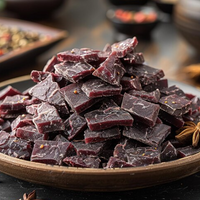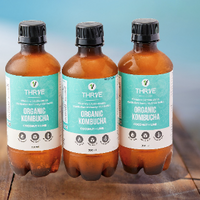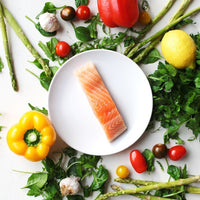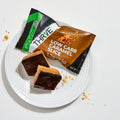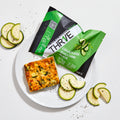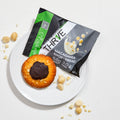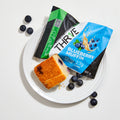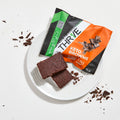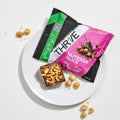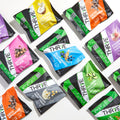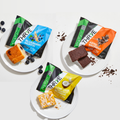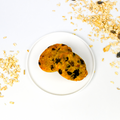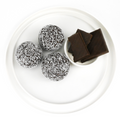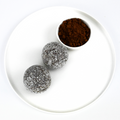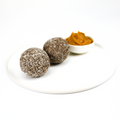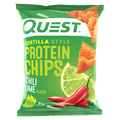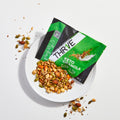From reducing inflammation to improved focus, THR1VE ambassador Scott Gooding shares his experience with a low carb, high fat (LCHF) diet.
 What got you interested in the low carb way of eating?
What got you interested in the low carb way of eating?I guess it been a slow evolution over the last 5-6 years really. I’ve always considered myself to be eating ‘healthy’ with the information I’ve had at the time. I’m the first to admit that some of the choices I made back then weren’t what I would call healthy now – and this could be the case in 3-4 years time. The diet took a distinct change of direction when I decided to focus on non-inflammatory foods in a bid to manage the symptoms of a back condition I was experiencing at the time. It became evident that I was following a ‘Paleo Diet’ but in the early days I was having sweet potato with every meal… slowly over the last few years I’ve reduced my carbs to suit a keto diet, or even at worse cyclical keto protocol – often as a result of increased carbs around training.
How strictly do you follow a low carb diet?
If you know me then you’ll know that I take my health pretty seriously… especially as I age. It took a while to get a library of recipes and to stock my fridge/pantry with the foods and recipes that enable me to thrive on a low carb diet. It can be confronting for some to transition from a high carb to low carb… particularly as we live in a carbohydrate landscape.
How many carbs do you consume/recommend consuming per day?
As a general rule of thumb aim for <30-50g carbs. It differs for everyone but between 30-50g is a good guideline. It’s worth mentioning that a high fat diet doesn’t mean avoiding ALL veg… sure starchy carbs might be contentious but you can afford to go nuts with greens such as Brussels, broccoli, cabbage and kale. THR1VE Protocol.
What benefits have you personally seen from the diet?
Arguably too many to mention but first and foremost the reduction in inflammatory foods has meant I’ve seen a huge improvement in my back condition symptoms.
Other improvements have been improved focus, recall and sustained energy. I’m the busiest I’ve ever been but also the most productive and I put that solely down to my diet and specifically adjusting my macros in favour of high fat/low carb. All the foods I choose to eat only serve to nourish and energise me as opposed to making me feel sluggish or lethargic as some can.
How did you help yourself first adjust to a low carb diet?
To get into ketosis is relatively easy and should only take a day or so if you restrict carbs or fast but I remember transitioning to a fat adapted ‘athlete’ was a little tougher – I’m no scientist but I put that down to my body having inadequate ‘fat-burning’ enzymes. I distinctly remember working-out feeling pretty ordinary for a few weeks until my enzymes and mitochondria up-regulated. Now I’ve adapted I have a much greater output in my workouts. There are number of hacks to help you transition to ketosis:
- MCTs (medium chain triglycerides): These are found in sources such as coconut oil (60-70% MCT) but it’s possible to get pure MCT (C8 & C10).
- Bulletproof coffee (MCT + Butter + coffee): These products help to encourage the propagation of ketones.
- Lastly exogenous ketones (supplementary): They flood your body with beta hydroxybutyrate (ketone body) elevating your blood ketones which allows you to reap the therapeutic properties of ketosis without necessarily being in nutritional ketosis.
What is your favourite low carb meal?
Tough question – but there are still lots of comforting favourites I cook that sit within the LCHF protocol:
- Steak and kidney casserole
- Lamb shoulder with greens
- Buttery leeks with eggs
What are your favourite resources you have used to learn more about the low carb diet?
There’s been a few but I listen to Dom D’agostino, Robb Wolf and have had the pleasure of meeting Dr Loren Cordain. More locally check out Cliff Harvey – an outstanding researcher from NZ.
What are your thoughts on intermittent fasting?
I’m actually doing a 48hr fast this week so I’m a big fan – that being said I haven’t been IF for long but now it’s certainly a weekly thing for me. It’s incredibly restorative for cells and allows the digestive system to “cleanse’ itself, in addition research has shown brain cells are preserved and even promoted growth – suggesting that IF improves cognitive function.
What are your thoughts on exogenous ketones and how can they benefit you?
I’m a promoter of exogenous ketones and have been a while now. I’m always exploring ways to optimise performance and health – with taking exogenous ketones I’ve noticed improved mental clarity and recall, I’m now able to multi-task for the first time in 40 years!
When we produce ketones naturally in our liver, by oxidising fat, we manufacture 3 ketones (acetone, acetoacetate and beta hydroxybutyrate) which are the preferred fuel source for the brain and heart. We now have the opportunity to take exogenous ketones by consuming one of those ketones – hydroxybutyrate. In addition to pure BHB, the supplement is often combined with other complimentary ingredients allowing us to tap into the therapeutic properties of being in ketosis. The elevated mood, cognitive function and sustained energy are felt within the hour which allows you to focus for longer and train harder for longer. For someone like myself who has a busy schedule, juggling family, training and work it’s a absolute game-changer.
Flooding your system with ketones has a number of benefits including reducing inflammation (suppressing inflammasones), up-regulating mitochondria, increasing insulin sensitivity and stabilising blood sugar – leading to reduced cravings. They also keep me in a ‘ketogenic state’ (elevated blood ketones) on training days when I might consume more carbs.

